TESOL 2019 Brings Together More Than 5,000 in Atlanta
On 13 March, the 2019 TESOL International Convention & English Language Expo opened in Atlanta, Georgia, USA. Renowned for its hospitality and rich local culture, Atlanta was the perfect host city for a convention that welcomed more than 5,000 professionals and 113 exhibitors from more than 100 countries. Also showcased at the Convention was the Recruiter Pavilion, which saw 13 recruiting companies facilitate numerous interviews throughout the course of the Convention.

The southern charm of Atlanta and myriad enthusiastic participants were only some of the highlights from the 2019 Convention. To kick off the event, anthropologist and linguist K. David Harrison provided the opening keynote to an excited crowd of thousands. During his address, Harrison shared his experiences researching and working to save endangered languages around the world through digital advocacy, sharing a variety of videos of his encounters with threatened and disappearing languages.
Over the course of 3 days, more than 1,000 sessions were offered, ranging from language assessment to technology, immigration, bilingual education, public policy, and more.
Convention Highlights and Online Resources
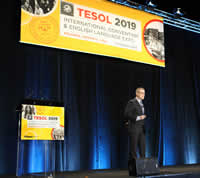 To begin each day, attendees gathered bright and early to see the morning keynote, which included Luciana C. de Oliveira’s presidential keynote, “Developing Expertise in TESOL: Local-Global Considerations”; Anneliese A. Singh’s “Everyday Teaching, Everyday Liberation: Building the Beloved Community as Educators”; and Pedro Noguera’s “The Power of Language, the Language of Power: Preparing Our Students for the Uncertainties of the 21st Century.” In case you missed any of the keynotes, recordings can be accessed here.
To begin each day, attendees gathered bright and early to see the morning keynote, which included Luciana C. de Oliveira’s presidential keynote, “Developing Expertise in TESOL: Local-Global Considerations”; Anneliese A. Singh’s “Everyday Teaching, Everyday Liberation: Building the Beloved Community as Educators”; and Pedro Noguera’s “The Power of Language, the Language of Power: Preparing Our Students for the Uncertainties of the 21st Century.” In case you missed any of the keynotes, recordings can be accessed here.
Atlanta also saw the official release of The 6 Principles for Exemplary Teaching of English Learners®: Adult Education and Workforce Development, the latest addition to The 6 Principles® line of products available from TESOL Press, as well as three general sessions focused on The 6 Principles®. The 6 Principles® are guidelines drawn from decades of research in language pedagogy and language acquisition theory and are targets for teaching excellence that should undergird any program of English language instruction.
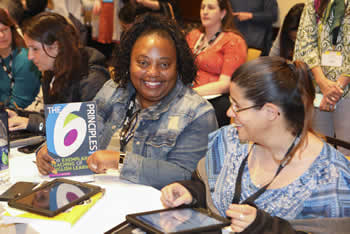
With advocacy being central to the TESOL field, a variety of advocacy and public policy sessions were offered in Atlanta. A series of special, invited speakers were offered to attendees, which included presenters from the U.S. Department of Education’s Office of English Language Acquisition; U.S. Citizenship and Immigration Services, Migrant Legal Action Program; and more. Some of the issues discussed during these sessions included immigration, citizenship, ESSA, and WIOA, and several sessions focused on local education policies and program initiatives impacting TESOL educators in the host state of Georgia.
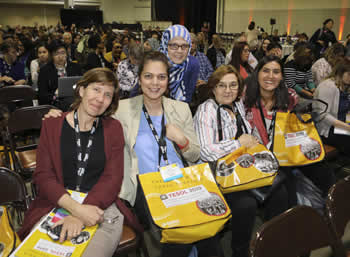 To close the Convention, TESOL held its Annual Business Meeting, where hundreds of TESOL members gathered to hear updates on the association’s growth over the past year. Providing a look into the association’s financial progress, as well as behind-the-scenes photos of TESOL’s newly renovated office, executive director Christopher Powers also detailed the association’s new strategic plan, which took effect in November 2018. As a last piece of business, new board members were sworn in, which included the passing of the gavel to the association’s new president, Deborah Healey, and the installation of Deborah Short as president-elect. Other new board members included Grazzia Mendoza Chirinos, Justin Shewell, and Debra Suarez.
To close the Convention, TESOL held its Annual Business Meeting, where hundreds of TESOL members gathered to hear updates on the association’s growth over the past year. Providing a look into the association’s financial progress, as well as behind-the-scenes photos of TESOL’s newly renovated office, executive director Christopher Powers also detailed the association’s new strategic plan, which took effect in November 2018. As a last piece of business, new board members were sworn in, which included the passing of the gavel to the association’s new president, Deborah Healey, and the installation of Deborah Short as president-elect. Other new board members included Grazzia Mendoza Chirinos, Justin Shewell, and Debra Suarez.
Once the official business of the Convention concluded, it was time to celebrate shell-abrate! More than 1,000 TESOLers made the short walk down to the world-renowned Georgia Aquarium. Enjoying great food and drink, attendees had front-row seats to beluga whales and sea turtles as they networked into the evening with new friends and old, capping-off an eventful week in Atlanta.
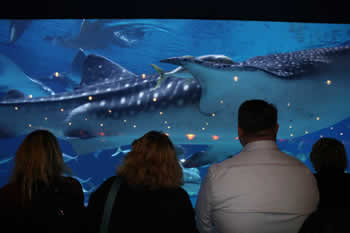
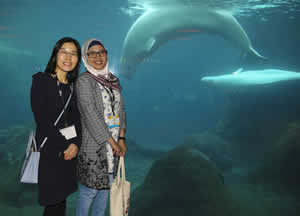
PreK–12 Day
The annual PreK–12 Day provided teachers and administrators with the opportunity to participate in more than 20 workshops that concentrated on topics such as coteaching strategies, interrupted learning, teaching students with special needs, assessments, and dual language and multilingualism. During her keynote address at PreK–12 Day, Ayanna Cooper presented critical information to help school administrators and instructional leaders examine their own school communities, with the ultimate goal of improving outcomes for English learners.
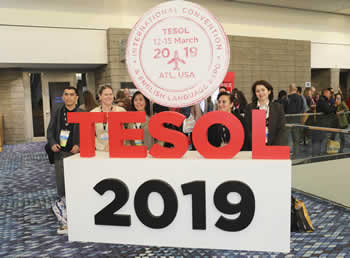 TESOL 2020 in Denver, Colorado, USA
TESOL 2020 in Denver, Colorado, USA
It’s never too early to start planning for next year’s Convention, which will be held in Denver, Colorado, USA on 31 March–3 April 2020. The deadline for all proposal submissions is 1 June 2019. Details coming soon.
To become a proposal reviewer, register here.
TESOL Blogs
Interested in writing a blog for TESOL?
Read the submission guidelines and send us your post!
Check out a few recent TESOL Blog posts:
|
Augmented Reality for Language Learning, by Greg Kessler
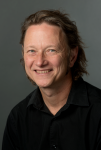 Augmented reality (AR) presents us with so many opportunities for language teaching and learning. If you are not familiar with this concept, perhaps the best example is Pokémon Go! This cultural phenomenon continues to be so compelling that it has inspired news events such as this one, just yesterday: “After causing mayhem, Pokemon Go shut down at Minnesota State Fair.” Augmented reality (AR) presents us with so many opportunities for language teaching and learning. If you are not familiar with this concept, perhaps the best example is Pokémon Go! This cultural phenomenon continues to be so compelling that it has inspired news events such as this one, just yesterday: “After causing mayhem, Pokemon Go shut down at Minnesota State Fair.”
This viral AR game captured the world’s imagination a few years ago, and I believe the engagement that this technology promotes can be harnessed for similar effect in the language classroom. AR allows us to interact with the physical world around us while our understanding is enhanced through the addition of digital content that is layered on that physical world. This additional content can include any information that might be helpful for a particular experience, such as video, directional guidance, historical content, or a virtual personal guide. Read more. |
|
5 Ways to Help ELs Develop Pride in Their Heritage, by Judie Haynes
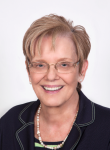 English learners (ELs) offer a rich resource from which mainstream teachers and students can learn about other languages and cultures. If teachers support the diversity in their classrooms, all students will begin to understand and value the many distinct cultures of the world. Teachers should take advantage of this natural resource that is in their classrooms and support ELs from diverse backgrounds to develop pride in their heritage. Following are some classroom practices that you and your colleagues can adopt to help the ELs in your school develop pride. Read more. English learners (ELs) offer a rich resource from which mainstream teachers and students can learn about other languages and cultures. If teachers support the diversity in their classrooms, all students will begin to understand and value the many distinct cultures of the world. Teachers should take advantage of this natural resource that is in their classrooms and support ELs from diverse backgrounds to develop pride in their heritage. Following are some classroom practices that you and your colleagues can adopt to help the ELs in your school develop pride. Read more.
|
|
A Framework for Understanding Games and Learning, by Jeff Kuhn
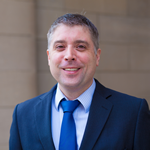 Hi all, welcome to another edition of the TESOL Games and Learning blog! This month I wanted to highlight Reinhardt and Sykes’ (2012) framework for incorporating games into classroom practice in response to Mary McDonnell who, on my initial blog post, asked for some games and learning research. Hi all, welcome to another edition of the TESOL Games and Learning blog! This month I wanted to highlight Reinhardt and Sykes’ (2012) framework for incorporating games into classroom practice in response to Mary McDonnell who, on my initial blog post, asked for some games and learning research.
Reinhardt and Sykes (2012) have outlined a four-part framework for games in the language classroom that considers best practices for the use of games for second language (L2) learning. It’s a fantastic entry point for understanding the ways educators can view games and their role in the classroom. Read more. |